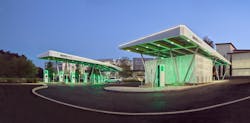Another Step Toward a New Nationwide Network of EV Chargers
In keeping with President Biden’s commitment to jumpstart the construction of a national network of 500,000 electric vehicle (EV) chargers by 2030, the U.S. Department of Transportation’s Federal Highway Administration announced on June 9 a Notice of Proposed Rulemaking (NPRM) on proposed minimum standards and requirements for projects funded under the National Electric Vehicle Infrastructure (NEVI) Formula Program.
These minimum standards will help ensure that the national EV charging network is user-friendly, reliable, accessible to all Americans and interoperable between different charging companies, with similar payment systems, pricing information, charging speeds, and more.
“To support the transition to electric vehicles, we must build a national charging network that makes finding a charge as easy as filling up at a gas station”. said U.S. Transportation Secretary Pete Buttigieg said in the press release. “These new ground rules will help create a network of EV chargers across the country that are convenient, affordable, reliable and accessible for all Americans.”
The proposed rule would establish the groundwork for states to build federally-funded charging station projects across a national EV charging network, an important step towards making electric vehicle charging accessible to all Americans. No matter what kind of EV a user drives, what state they charge in, or what charging company they plug into, the minimum standards will ensure a unified network of chargers with similar payment systems, pricing information, charging speeds, and more. The standards also establish strong workforce requirements for installation, maintenance, and operations to increase the safety and reliability of charging station function and use, and create and support good-paying, highly-skilled jobs in communities across the country.
“We’re tackling range anxiety and vehicle charging deserts by making sure that charging stations are easily and equally accessible, allowing every American can get coast to coast in an electric vehicle,” said U.S. Secretary of Energy Jennifer M. Granholm, in the press release. “The investments made possible by the Bipartisan Infrastructure Law will not only build an interconnected national charging network, but also boost local economies and strengthen our independence from the volatilities of fossil fuels.”
